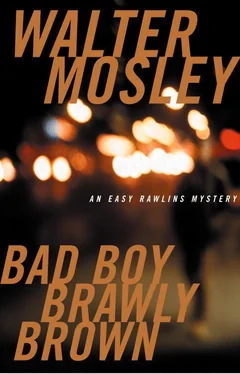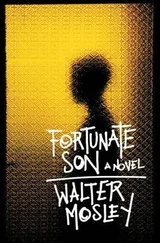“Mr. Raw-wins, you like blue?”
“Yes, sirree,” I said. “Blue is the color of music.”
“Music don’t hab no color,” Arty said.
“Not when you’re a boy,” I replied. “But when you grow up it will be blue that you see when the music makes you cry.”
Artemus gazed up at me with wondering, amazed eyes. Somehow my words made him think something that stopped everything else.
A car door slammed outside and Arty screamed, “Daddy!”
He jumped up and ran for the door. Blesta came in from the kitchen. I stood up. A few moments later the front door opened.
“Blesta, baby, somebody’s car parked out f—” he said before catching sight of me.
Artemus grabbed onto his leg chanting, “Daddy, Daddy, Daddy...”
Blesta turned on that smile.
“Hey, Merc,” I hailed, stretching out my hand.
He shook with me but there was suspicion in his eye.
Mercury was a shade darker and six inches shorter than I. He was truly big-boned, not fat or even chubby. He had the kind of build that professional boxers are trained to stay away from — powerful and low to the ground.
“Mr. Rawlins,” he said.
“I just finished gettin’ your wife to call me Easy, Merc. Don’t mess it up now.”
“He said he had to talk with you, honey,” Blesta said, kissing him on the cheek. “I told him to wait in here ’cause old Mrs. Horner would sure call the cops if he stayed out in his car.”
“Sit in the car?” Mercury said. “Easy Rawlins don’t have to sit in no car in front’a my house. You want somethin’ to drink?”
“No thanks, Merc.”
“What you come by for?” he asked, all smiles and openness.
“I need to ask you a few questions,” I said.
“Come on, Arty,” Blesta said. “Come help Mama make dinner.”
“I wanna stay wit’ Daddy.”
“I’m makin’ frostin’.”
Without another word Arty picked up his coloring book and ran from the room, his mother right behind him.
I returned to the yellow sofa while Mercury perched on a turquoise hassock.
“What you need, Easy?” he asked. “More about Brawly?”
“In a roundabout way,” I said. “What you know about the houses they buildin’ down a couple of blocks from where John’s lots are?”
“Down where they got the pink flags hangin’ from the eaves?”
“Yeah,” I said. “How’d you know?”
“A man got shot down there last night.”
“Who?” I asked.
Mercury shook his head. “All I know is that the cops come down and closed up any construction on that block. They didn’t say who it was.”
“Who’s buildin’ those houses?”
“I don’t know exactly. It’s another black investment group, though. I’m pretty sure it’s one’a Jewelle’s.”
“She got them, too, huh?”
“Yes, sir. But I don’t know their names. We all keep pretty separate out around there.”
“So you never been over to that site?” I asked.
“No.”
“How about Brawly?”
“Maybe, yeah. If John wasn’t around, Brawly’d take him some long walks, if you know what I mean. He’d ramble around lookin’ for someone to talk to. You know I don’t have much patience for talkin’ on the job. Brawly got along better with Chapman than he did with me.”
“Chapman ever tell you what Brawly was talkin’ ’bout?”
“Just shit, man. Brawly got an opinion on everything under the sun. Boy’d talk a blue streak and not say one goddamned thing.”
“So you didn’t like workin’ with ’im too much then?”
“Man, I don’t like workin’ construction — period,” Mercury said. “Matter of fact, I’m thinkin’ that I’m gonna leave this whole thing.”
“You quittin’?”
“Quittin’, pullin’ up stakes, an’ headin’ back down to where people talk like I talk.”
“Back to Arkansas?”
“Maybe Texas,” Mercury said. “There’s gettin’ to be some jobs down there. They havin’ what you call a oil boom.”
“Chapman leavin’, too?”
“What am I?” he asked. “Chapman’s keeper? Niggah can take care of his own business.”
“You ever hear about a man named Henry Strong?” I asked in ambush.
“Yeah,” he admitted, unperturbed.
“Where from?”
“A couple’a months ago. Brawly came by with him. They took me an’ Chapman to Blackbird’s for a shot or two.”
“What he have to say?”
“Just all that black shit. You know, how we all should have what the white man have. He wanted us to come down to his meetin’-house. I told him no.”
“What did Chapman say?”
“Why don’t you ask Chapman?”
“I’m askin’ you, Mercury. I figure you owe me one thing, at least.”
“You have my gratitude, Mr. Rawlins. But I ain’t tellin’ you nuthin’ ’bout my friends. No, sir.”
Of course he’d told me volumes by refusing to talk.
“Why you askin’ ’bout Strong and them places down the way?” Mercury asked.
“No reason really,” I said. “I saw him down at the place where Brawly’s been hangin’ out. I tell ya, tryin’ to get a handle on Brawly is givin’ me more trouble than I figured.”
“Yeah,” Mercury said. “That Brawly’s a mess.”
“Well,” I said. “I better be goin’.”
I stood up.
“Okay,” Mercury replied. “Honey, Mr. Rawlins’s leavin’.”
Blesta came out wearing a white apron over her housedress. There was a chocolate smudge under her left breast.
“Cain’t you stay for dinner... Easy?”
“Got to go.” I shook hands with her.
“This is for you,” little Artemus Hall said, holding up the clown torn from his coloring book.
I took the leaf and stared at it. The clown’s head was tilted slightly to the side. Artemus had made the face white and brown with big red tears coming out of the sad eyes.
“Thank you very much, Arty. I’m gonna put this one up in my kitchen. I gotta corkboard in there and I’m gonna put this one up on a tack.”
I could see Mercury in the boy’s smile.
The next person on my list was Tina Montes. She’d been kind to me the night the police broke in on the First Men and I pulled her out of there before they could crack her skull.
She lived in a rooming house on Thirty-first Street. The woman who owned it, Liselle Latour, was a pal of mine from the old days in Houston, Texas. Liselle had been born Thaddie Brown but changed her name when she ran away from home at thirteen. She’d turned to prostitution and had become a madam by the time she was twenty-five. She left Houston in ’44 with her partner/bodyguard/boyfriend Franklin Nettars. Frank had been pestering Liselle to leave Houston for years. He told her that the black folks up in L.A. made real money and that a small whorehouse around there would make them rich.
Liselle would have never left but for a fight that had come to pass in her house of ill repute. A white man — I never got his name — had a disagreement with one of the whores and wound up with a knife in his throat. The woman was arrested. Liselle managed to stay out of jail but she knew her name had been placed on the police list. And once you went on the police list in Houston, you either died, went to jail, or left town.
They took a sleeper cabin in a special colored car on the Sunset Express from Houston to L.A. The whole way Franklin was telling Liselle how great it would be when they got to California.
“He’d be sayin’,” Liselle told me, “that you could live pickin’ fruit off’a the trees while you was walkin’ down the street.” She always smiled when she mentioned his name.
The porter dropped by their cabin to tell them that they were just about to cross the California line.
Читать дальше












